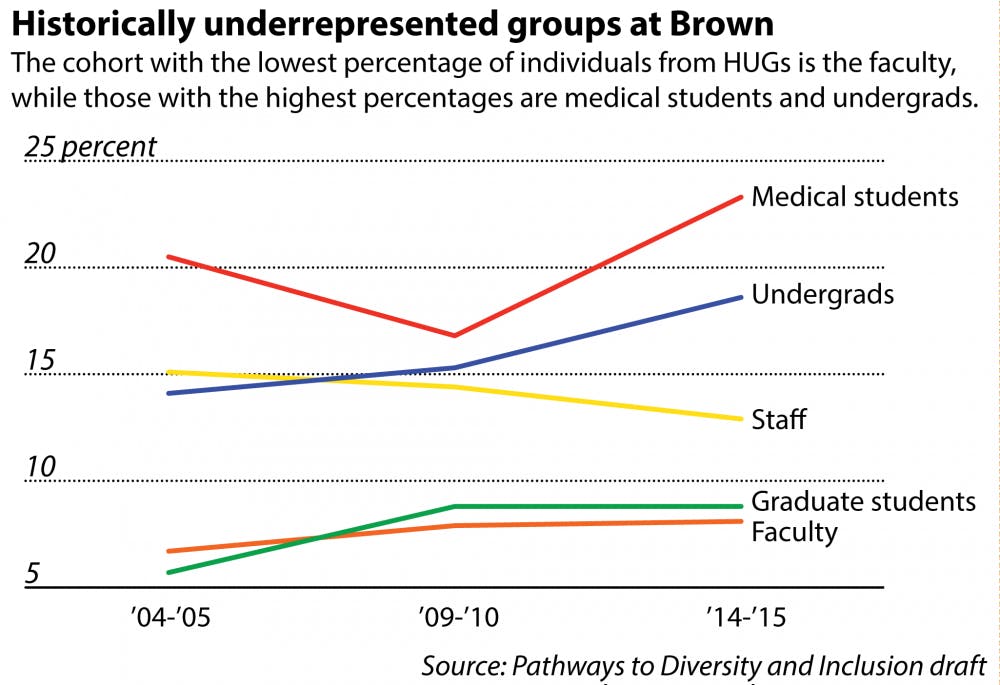A working draft of the University’s action plan for diversity and inclusion released Thursday night outlines investments totaling more than $100 million over the coming decade that will “promote diversity and inclusion and confront the issues of racism, power, privilege, inequity and injustice that are part of the Brown experience for so many members of our campus,” the action plan states.
The document, titled “Pathways to Diversity and Inclusion: An Action Plan for Brown University,” was originally set to be released at the end of the month in its final form. But after the alleged assault of a visiting Dartmouth student who was a delegate to the Latinx Ivy League Conference by a Department of Public Safety officer Saturday, administrators opted to share a working draft of the document this week and field community input.
An online feedback form will be available until Dec. 4, at which point the University will review the submitted comments, modify the plan and release a final version by the end of the semester, Paxson wrote.
The University committed to creating a center for first-generation college students by fall 2016 and hiring a new dean “dedicated to working with and supporting first-generation and low-income students,” according to the plan. Additionally, the plan states the University will increase funding for low-income students to access needed goods and services such as health insurance, textbooks and laptops.
The Office of Campus Life and Student Services will double the money available through its Emergency Fund. The plan also states the University will increase access to housing and dining services during breaks.
The plan details efforts to increase diversity in hiring, bolster support services on campus for students from historically underrepresented groups, implement faculty and staff diversity and sensitivity training and foster research, teaching and discussion on issues of diversity.
The document reiterates the University’s commitment to hiring 55 to 60 faculty members from historically underrepresented groups by the 2024-25 academic year, which would double the current number of such faculty members. It will do this through more cluster hiring, continued support for the presidential postdoctoral fellows program and a new program aimed at attracting visiting senior scholars from historically underrepresented groups.
The plan also commits to doubling the number of graduate students from historically underrepresented groups within the same period of time. To further this goal, the Graduate School and Alpert Medical School are currently looking to fill administrative positions to oversee targeted diversity recruitment efforts.
Additionally, the plan states that the University will add two or three staff positions in the 2016-17 academic year that will work with the Brown Center for Students of Color, the Sarah Doyle Women’s Center and the LGBTQ center.
The plan also recommends creating a Native American and Indigenous Peoples Initiative to help recruit faculty members and postdoctoral fellows who do work in this area.
The document mentions the piloting of several professional development workshops related to race, ethnicity, gender, sexuality and identity this January for faculty members, staff members, graduate students and administrators. The development of these workshops will draw on faculty members and compensated grad students with relevant expertise.
The plan does not explicitly state whether such workshops, once finalized, will be mandatory for faculty or staff members.
The University is also developing an orientation program for new faculty and staff members that looks at those topics and their intersectionalities.
Beyond these measures, individual departments will be responsible for developing and implementing specific training programs and professional development opportunities suited to their specific needs.
The document also states that the University will “examine the need for additional diversity and sensitivity training for all officers in the Department of Public safety,” but it does not commit to any changes in relation to campus police.
The Center for the Study of Race and Ethnicity in America and the Center for the Study of Slavery and Justice will both be expanded in order to provide additional resources for and strengthen “interdisciplinary scholarship on issues related to structural racism and social justice,” according to the plan. The BrownTogether comprehensive campaign identified the two centers as fundraising priorities, the plan states, and the University is seeking $10 million in gifts for each.
With support from the Provost’s Office, CSREA will launch a series of events on “How Structural Racism Works,” with the first taking place in December. This project will be one of several efforts to spark University-wide discussion on power, privilege, identity and structural racism, with the goal of making “Brown a leader on understanding and addressing structural racism in our society,” the plan states.
The plan also proposes doubling the number of sophomore seminars centered on power, privilege, inequality and social justice.
Going forward, the University will develop a call for proposals next month to start the process of finding an external firm to design a campus climate survey to gauge bias and discrimination more effectively.
The Office of Institutional Diversity will release an annual public report that will track the success of initiatives laid out in the action plan, and a Diversity Inclusion and Oversight Committee will form this spring to coordinate these efforts.
Administrators could not be reached for comment by press time Thursday evening, and students who have been vocal in calling for change declined to comment on the plan.





